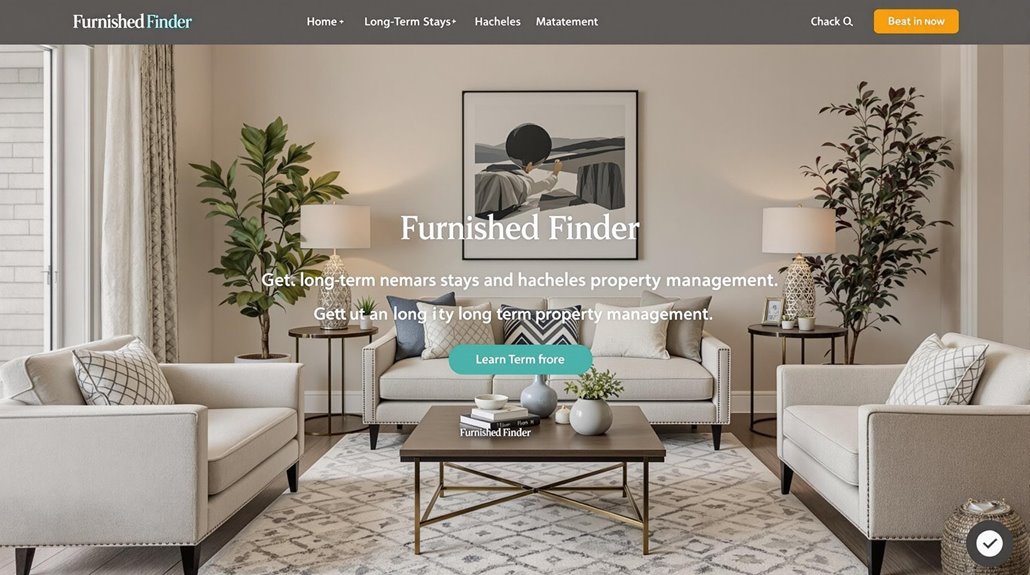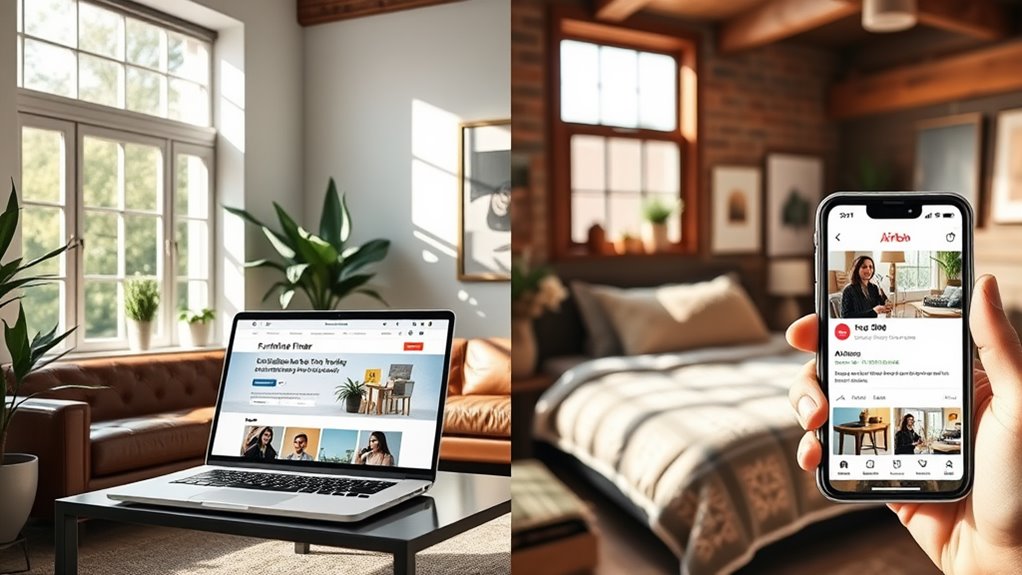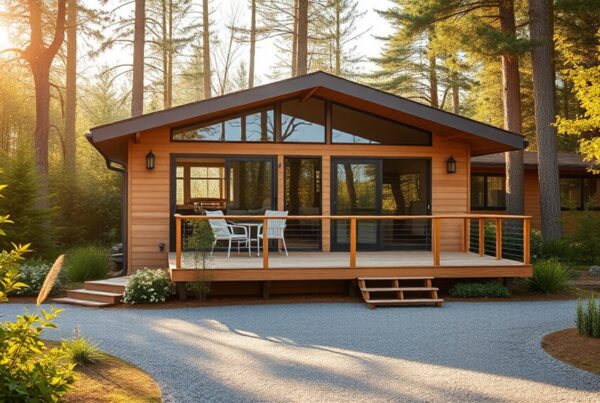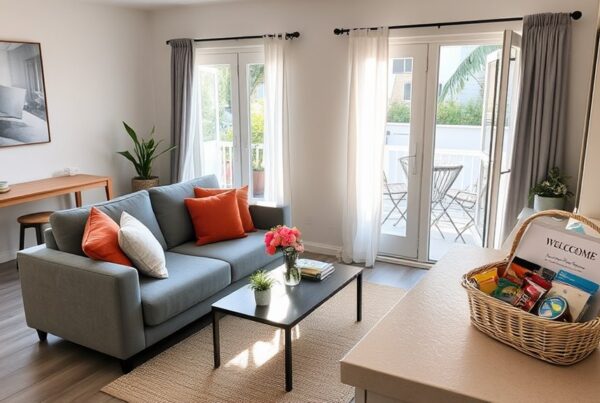Furnished Finder offers over 150,000 mid-term rental properties in the U.S., focusing on professionals like travel nurses, with a flat annual fee of $149 and no booking commissions. In contrast, Airbnb’s 7.7 million global listings cater to a broader audience but charge 3%-20% per booking, increasing costs. Furnished Finder’s tenant screening via KeyCheck guarantees safer stays, while Airbnb relies on user reviews. Discover how Furnished Finder Vs Airbnb aligns with your rental goals for a detailed comparison.
Key Takeaways
- Furnished Finder is ideal for mid-term rentals with a flat $149 annual fee, while Airbnb charges 3%-20% per booking.
- Furnished Finder offers thorough tenant screening via KeyCheck, whereas Airbnb relies on user reviews for safety.
- Furnished Finder targets professionals like travel nurses; Airbnb caters to a broader, global audience for short-term stays.
- Furnished Finder has no booking commissions; Airbnb charges hosts 3% and guests 14%, increasing overall costs.
- Airbnb supports global exposure with 7.7M listings; Furnished Finder focuses on U.S.-based mid-term rentals.
Overview of Rental Platforms
If you’re comparing Furnished Finder and Airbnb, it’s essential to understand their distinct focuses and operational models. Furnished Finder specializes in mid-term rentals, typically 30 days or more, targeting professionals like travel nurses and remote workers. It operates primarily in the U.S., with over 150,000 monthly furnished rental properties listed. In contrast, Airbnb offers a global platform with 7.7 million active listings across 220 countries, catering to short-term stays. Property owners on Furnished Finder pay a flat annual fee of $149, while Airbnb charges hosts 3% of the booking subtotal and guests up to 14% in service fees. For tenant screening, Furnished Finder partners with KeyCheck, giving property owners access to background checks. Airbnb relies on user-generated reviews and lacks thorough guest screening. If you’re a property owner seeking more control over tenant selection, Furnished Finder’s model may appeal more than Airbnb’s automated approach. Understanding how seasonal fluctuations impact occupancy rates and pricing strategies can help property owners make informed decisions on which platform to choose.
Pros and Cons of OTAs (Furnished Finder Vs Airbnb)
You gain access to a massive audience with over 7.7 million listings on Airbnb and a competitive presence on VRBO, boosting your property’s visibility. However, you’ll face high service fees, with Airbnb charging 10-15% and VRBO around 8%, cutting into your potential earnings. These fees often outweigh the broad exposure unless you optimize your pricing strategy. Understanding vacancy rates can help you assess market demand and set competitive pricing to maximize profitability.
Wide Audience Reach
While OTAs like Airbnb and VRBO excel in wide audience reach, their global scale comes with both advantages and drawbacks. These platforms attract millions of users—Airbnb alone saw over 300 million bookings in 2021—giving your furnished property unparalleled visibility. This global recognition enhances trust, making it easier to secure rental bookings. However, their vast reach doesn’t guarantee the perfect guest match, especially for niche markets like travel nurse housing. Here’s a quick breakdown:
- Global Exposure: Your property gains access to a massive, worldwide audience.
- Trust and Credibility: Guests are more likely to book through established platforms.
- Limited Control: Communication options are restricted until a booking is confirmed, making it harder to vet potential guests directly.
Understanding tenant demographics can help refine your marketing strategy and attract the right audience. While OTAs widen your reach, their one-size-fits-all approach may not suit every rental scenario.
High Booking Fees
High booking fees on OTAs like Airbnb and VRBO impact both hosts and guests, creating a financial trade-off for the convenience they offer. Airbnb fees can reach up to 14% for guests and 3% on the booking subtotal for hosts, considerably eating into rental income. For traveling professionals seeking longer stays, these costs quickly add up, potentially deterring bookings. While the split fee model complicates financial forecasting for hosts, high occupancy rates and background checks provided by OTAs can justify the expense. However, compared to platforms like Furnished Finder, which focus on lower fees, Airbnb’s high booking fees may reduce profitability despite its wide audience reach. Analyzing your short-term rental strategy helps determine if these fees align with your financial goals. Additionally, landlords financing properties through seller financing may find these high fees especially burdensome, as they limit cash flow needed for loan repayments.
Benefits of Furnished Finder

With a $99 annual listing fee, Furnished Finder presents a cost-effective alternative to platforms like Airbnb, which often impose higher service charges. Catering specifically to mid-term rentals of 30 days or more, it attracts reliable tenants such as travel nurses and medical professionals, guaranteeing stable occupancy rates. The platform’s focus on entire properties and longer stays—averaging nearly three months—maximizes your cash flow compared to traditional 12-month leases. You’ll also benefit from direct communication with tenants before booking, fostering transparency and trust. Additionally, Furnished Finder includes built-in tenant screening through KeyCheck, providing a background check that reduces risks. Passive income opportunities through consistent cash flow make it an appealing choice for investors seeking long-term stability.
Here’s why Furnished Finder stands out:
- Lower Fees: Save considerably with its $99 annual fee versus Airbnb’s higher per-booking charges.
- Targeted Audience: Attract dependable tenants like travel nurses and medical professionals.
- Enhanced Security: Built-in background checks guarantee tenant reliability and smoother rent collection.
This platform is ideal if you seek stability, cost efficiency, and peace of mind in managing your rentals.
Cost Comparison
Furnished Finder charges a flat annual fee of $179, eliminating additional booking commissions, while Airbnb’s fees range between 3% to 20% per booking, depending on the model you choose. Airbnb typically imposes a host fee of 14-16% or a split fee totaling around 17% between hosts and guests, which can greatly increase costs for high-volume rentals. Property owners prioritizing cost predictability and long-term rentals often find Furnished Finder’s fixed annual fee more economical than Airbnb’s variable, commission-based structure.
Annual Subscription Fees
While Furnished Finder charges a flat $99 annual subscription fee for property listings, Airbnb operates on a commission-based model, taking around 3% of the booking subtotal from hosts and adding 14-16% in guest charges. This difference in pricing structures directly impacts landlords and tenants. Furnished Finder’s annual fee guarantees predictable costs, allowing property owners to budget effectively regardless of booking frequency. In contrast, Airbnb’s commission-based model can lead to fluctuating expenses based on booking prices.
Here’s a quick breakdown:
- Furnished Finder: $99 annual fee, no additional booking fees.
- Airbnb: 3% host fee, 14-16% guest charge per booking.
- Predictability: Furnished Finder offers fixed costs; Airbnb’s fees vary.
For landlords seeking stability, Furnished Finder’s flat annual fee is advantageous, while Airbnb’s model may suit those with high booking volumes willing to absorb variable costs.
Booking Commission Rates
One key difference between Furnished Finder and Airbnb lies in their commission structures. Furnished Finder charges a flat annual fee of $149, eliminating booking commission rates entirely. This model provides predictable costs for hosts, especially beneficial for rental accommodation targeting healthcare workers and traveling nurses. In contrast, Airbnb employs a split fee system, where hosts pay around 3% per booking, and guests incur roughly 14% in service fees. Alternatively, hosts can opt for a host-only fee structure, paying 14-16% per booking. These variable costs can accumulate considerably over time, making Airbnb more expensive for landlords compared to Furnished Finder’s fixed pricing. If you prioritize lower and predictable costs, Furnished Finder’s flat annual fee offers a clear advantage over Airbnb’s split fee model.
Tenant Screening and Safety

When evaluating tenant screening and safety, Furnished Finder’s partnership with KeyCheck provides landlords with a more robust system compared to Airbnb’s reliance on user reviews. With Furnished Finders, you gain access to thorough background checks, ensuring you can vet potential tenants thoroughly. Airbnb vs Furnished Finder highlights a key difference: Airbnb lacks proactive tenant screening, relying instead on user reviews, which may not reveal critical safety concerns. Here’s how Furnished Finder excels:
- Background checks: Furnished Finder integrates KeyCheck to verify tenant history, while Airbnb doesn’t perform these checks.
- Control: You retain direct control over tenant selection, unlike Airbnb’s guest-driven process.
- Safety tools: Both platforms offer safety tools, but Furnished Finder’s proactive system enhances landlord peace of mind.
Automating Property Listings With Management Software
To optimize efficiency and minimize errors in property management, vacation rental software like iGMS can automate listings across platforms such as Furnished Finder and Airbnb. By syncing calendars in real-time, you eliminate scheduling conflicts and guarantee your property’s availability is up-to-date across all channels. This tool allows you to list your property on multiple platforms simultaneously, expanding your reach to attract more guests. Automating property listings also reduces manual effort, enabling you to focus on enhancing the guest experience. Vacation rental software can process payments securely, track revenue, and generate financial reporting tools, providing insights into your rental performance. Additionally, it facilitates direct bookings by integrating guest inquiries and automated messaging, streamlining communication. By centralizing operations, you maintain a consistent presence on both Furnished Finder and Airbnb, while leveraging analytics to refine your strategy and maximize rent potential.
Conclusion
When choosing between Furnished Finder and Airbnb, weigh your priorities: Airbnb thrives on short-term, high-volume bookings, while Furnished Finder caters to longer stays with minimal fees. Data shows Airbnb’s global reach boosts visibility but incurs higher costs, whereas Furnished Finder’s niche focus maximizes profitability for extended rentals. Like a compass guiding your investment, the right platform depends on your target audience—balance convenience, cost, and tenant quality to align with your property’s potential.




